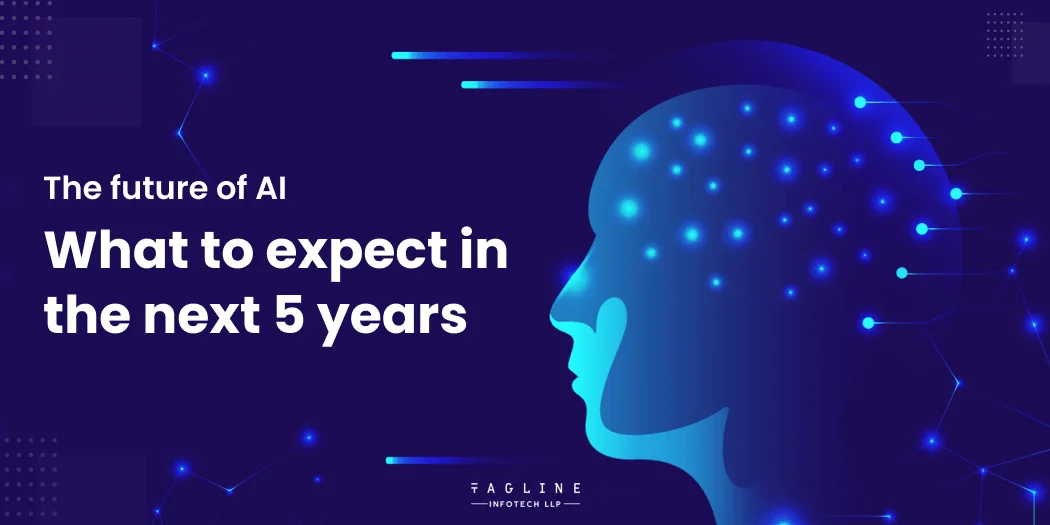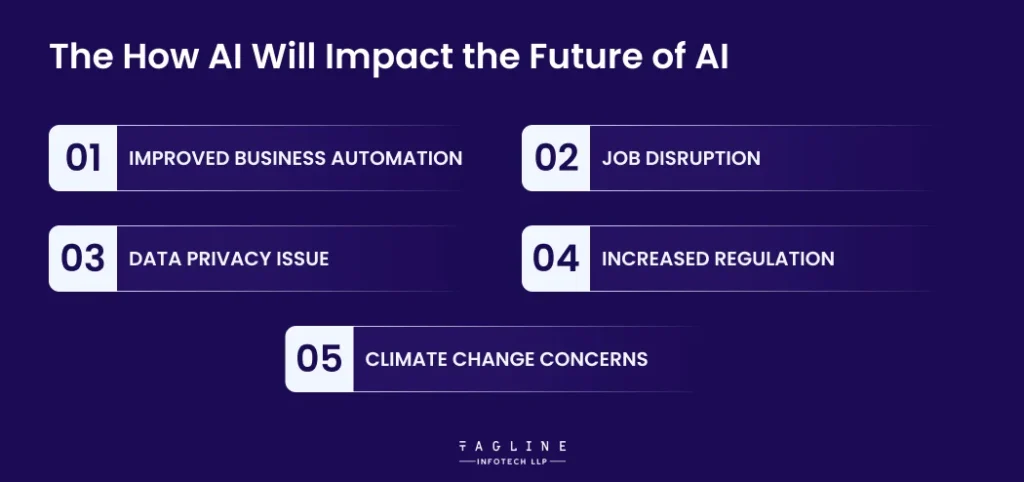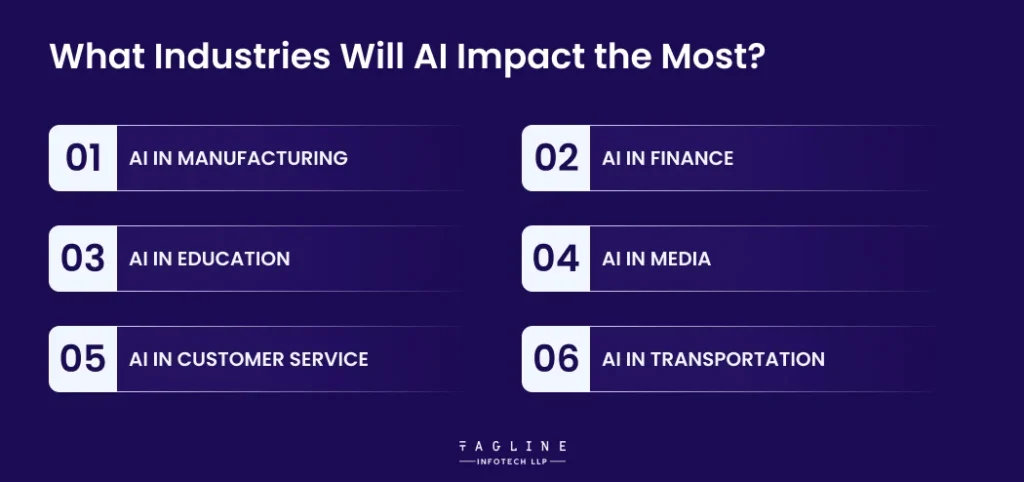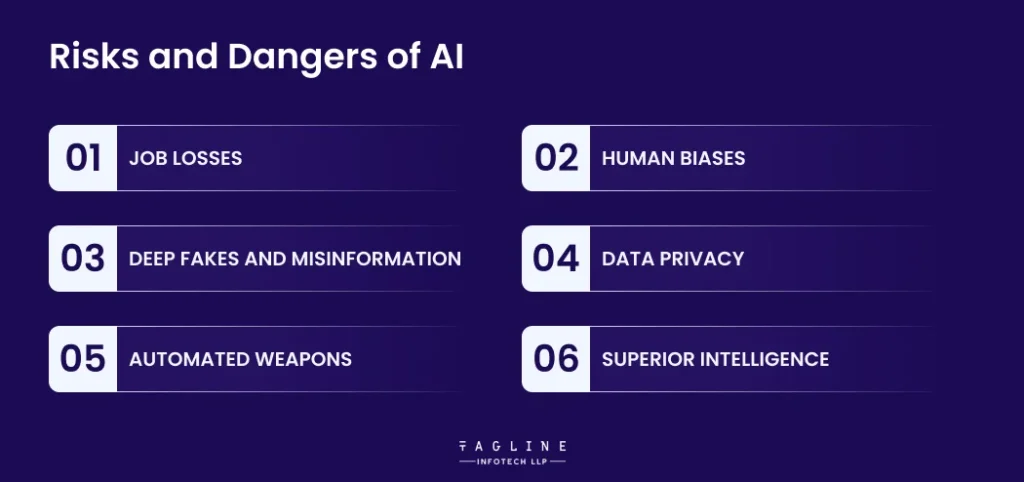What is the best way to format Python...
July 3, 2025
Home >> AI >> The future of AI: What to expect in the next 5 years

Artificial intelligence (AI) in 5 years is expected to revolutionize the world. As AI technologies advance, their impact will be profound across healthcare, finance, transportation, and education sectors. These advancements will enhance efficiency, drive economic growth, and create new opportunities.
Generative AI and machine learning are leading this transformation. These technologies enable smarter automation, better data analysis, and more personalized user experiences. In healthcare, AI will facilitate faster diagnoses, customized treatments, and advanced medical research. AI will improve fraud detection, streamline operations, and offer personalized financial advice in finance. The transportation sector will see the rise of autonomous vehicles and optimized logistics, while education will benefit from tailored learning experiences and improved administrative efficiency.
A 2023 IBM survey indicates that 42 percent of large enterprises have already integrated AI into their operations, and 40 percent are considering its adoption. Additionally, 38 percent of organizations have incorporated generative AI into their workflows, with another 42 percent contemplating its use. These statistics underscore the growing confidence in AI’s capabilities and its potential to drive significant change.
AI is also the driving force behind emerging technologies such as big data, robotics, and the Internet of Things (IoT). The rise of generative AI has further expanded AI’s possibilities, making it more versatile and influential. As these technologies evolve, they promise to create a more interconnected and intelligent world.
The rapid advancement of AI necessitates swift adaptation by industries and society. How will AI affect the future is a question that many are exploring as the technology continues to evolve. The future of AI holds the promise of transformative impacts, shaping a world where technology enhances human capabilities and fosters innovation across all sectors. As we look ahead, understanding what is the future of AI becomes crucial for staying ahead in this evolving landscape.
AI has advanced significantly since 1951, when Christopher Strachey developed the first documented AI program, a checkers game that completed a full match on the Ferranti Mark I computer at the University of Manchester. Milestones such as IBM’s Deep Blue defeating chess grandmaster Garry Kasparov in 1997 and IBM Watson winning Jeopardy! in 2011 have marked its progress, thanks to developments in machine learning and deep learning.
In recent years, Build generative AI has driven the latest phase of AI evolution. OpenAI launched its first GPT models in 2018, culminating in the development of the GPT-4 model and ChatGPT. These advancements have led to a surge in AI generators capable of producing relevant text, audio, images, and other types of content from user queries.
AI’s applications extend beyond entertainment and games. It has been instrumental in sequencing RNA for vaccines and modeling human speech. These technologies rely on model- and algorithm-based machine learning, increasingly focusing on perception, reasoning, and generalization.

Approximately 55 percent of organizations have implemented AI in various capacities, indicating a trend towards greater automation in the near future. The growing use of chatbots and digital assistants allows companies to leverage AI for managing routine customer interactions and addressing basic employee inquiries.
AI’s capability to process vast amounts of data and present the results in accessible visual formats significantly speeds up decision-making. Company leaders can avoid the time-consuming task of sifting through data, instead using immediate insights to make well-informed choices.
As Artificial Intelligence (AI) becomes increasingly widespread across various industries, concerns about job security are growing among employees. They estimate that AI could potentially handle up to a third of their tasks. However, the impact and implications of AI differ significantly across different sectors and professions. While some roles, such as secretarial positions, face the looming risk of automation, others, like machine learning specialists and cybersecurity analysts, are experiencing increased demand.
Professionals in fields requiring advanced skills or creativity may find that AI complements rather than completely replaces their work. This reflects the evolving nature of AI, where collaborative efforts between humans and AI technologies enhance overall efficiency. Consequently, individuals and organizations are prioritizing the development of new skill sets to adapt to the changing job landscape influenced by AI.
Klara Nahrstedt, a distinguished computer science professor at the University of Illinois, emphasizes the critical importance of investing in education to prepare individuals for the future uses of AI. She stresses the necessity of upskilling to empower individuals to thrive in an increasingly AI-driven world.
Data privacy is becoming a big concern in India as companies use large amounts of personal data to train AI tools. Many people are worried about how their data is collected and used. Because of these concerns, the Ministry of Electronics and Information Technology (MeitY) is checking if OpenAI’s data practices break Indian privacy laws.
To address these issues, the Indian government has proposed a Data Protection Bill. This bill aims to protect people’s data privacy and shows that the government is taking this issue seriously. Although it’s not a law yet, the bill encourages AI companies to be more open and careful about how they collect data. This change highlights the growing focus on ethics and rules in India’s AI industry.
As AI technology advances rapidly, India is taking important steps to regulate its use. The government aims to foster innovation while protecting privacy and ensuring ethical practices. Key initiatives include the National Strategy for AI by NITI Aayog, which promotes ethical AI in sectors like healthcare and agriculture, and the proposed Data Protection Bill, focusing on user consent and data privacy.
The Ministry of Electronics and Information Technology (MeitY) is also working to promote AI while ensuring data security. Proposed regulations include ethical guidelines for AI, a regulatory sandbox for testing AI technologies, and specific rules for industries like healthcare and finance. The main challenges are balancing innovation with regulation, ensuring data privacy and security, developing fair and transparent AI systems, and building public trust through clear communication and education. As regulations evolve, ongoing dialogue among policymakers, industry experts, and the public is crucial to ensuring responsible AI use in India.
On a broader scale, AI stands to significantly impact sustainability, climate change, and environmental concerns. Optimists view AI as a tool to enhance supply chain efficiency, implementing predictive maintenance and other measures to minimize carbon emissions.
However, AI’s role in climate change is complex. The energy and resources needed to develop and sustain AI models could potentially increase carbon emissions by up to 80 percent, undermining sustainability efforts in the tech sector. Even if AI is integrated into climate-friendly technologies, the expenses associated with model construction and training could potentially worsen society’s environmental situation.

Almost every major industry has already been influenced by modern AI. Here are some sectors experiencing significant changes due to AI.
Manufacturing has seen the benefits of AI for many years. Dating back to the 1960s and 1970s, the industry has adopted AI-enabled robotic arms and other manufacturing bots. These industrial robots usually work alongside humans to complete specific tasks like assembly and stacking, while predictive analysis sensors help maintain equipment efficiency.
Across banks, insurers, and financial institutions, AI is utilized for various purposes, including fraud detection, auditing, and customer evaluation for loans. Additionally, traders leverage machine learning’s capability to analyze millions of data points simultaneously, enabling them to swiftly assess risk and make informed investment decisions.
The integration of AI into education is positioned to overhaul the learning journey for people of all ages. Harnessing machine learning, natural language processing, and facial recognition, AI digitizes textbooks, identifies instances of plagiarism, and evaluates students’ emotions to pinpoint those requiring additional assistance or disengaged. Presently and moving forward, AI customizes the learning experience to cater to the distinct needs of every student, heralding a fresh era of personalized education.
Even journalism is starting to use AI, and it’s only going to become more common. For instance, The Associated Press uses a tool called Automated Insights to create thousands of earnings report stories each year. But now, with new AI writing tools like ChatGPT coming into play, people are wondering how they’ll fit into journalism.
While many find robocalls bothersome, AI in customer service offers data-driven solutions that deliver valuable insights to both customers and providers. The customer service sector utilizes AI tools like chatbots and virtual assistants to enhance user experiences.
AI technology is reshaping how we move around. Self-driving cars and AI-powered travel planners are making transportation smoother and more accessible. These innovations enhance efficiency and convenience in travel. While self-driving vehicles are still in development, they hold the potential to offer safer and more reliable journeys down the road. With ongoing advancements in AI, we anticipate further improvements in transportation systems and overall travel experiences.

While AI has brought about significant advancements across various sectors, it also poses certain risks that warrant attention. Here are some potential challenges associated with artificial intelligence.
Between 2023 and 2028, approximately 44 percent of workers will experience disruptions in their skills due to AI implementation. However, not all workers will be impacted equally, as women are more likely than men to be exposed to AI in their roles. Compounded by the existing AI skills gap between genders, women face a higher risk of job displacement. Without adequate measures in place for upskilling, the widespread adoption of AI may lead to increased unemployment and limited opportunities for marginalized communities to enter the tech industry.
AI has garnered criticism for its tendency to mirror the biases of those who develop and train the algorithmic models. For instance, facial recognition technology often exhibits a preference for lighter-skinned individuals, resulting in discrimination against people with darker complexions. Without meticulous efforts to identify and eliminate these biases from the outset, AI tools risk reinforcing such biases among users and perpetuating social inequalities.
The proliferation of deepfakes blurs the distinction between fact and fiction, causing uncertainty among the public about what is genuine and what is not. When individuals struggle to discern deepfakes, the consequences of misinformation can be hazardous, affecting both individuals and entire nations. Deepfakes have been exploited for various purposes, including disseminating political propaganda, perpetrating financial fraud, and placing individuals, such as students, in compromising situations.
The use of public data to train AI models heightens the risk of data security breaches, potentially compromising consumers’ personal information. Additionally, companies exacerbate these risks by incorporating their proprietary data. According to a 2024 survey by Cisco, 48 percent of businesses have incorporated non-public company data into generative AI tools, with 69 percent expressing concerns about potential infringements on their intellectual property and legal rights. A single breach could jeopardize the data of millions of consumers and leave organizations susceptible to exploitation.
The integration of AI in automated weapons presents a significant risk to nations and their civilian populations. Despite their lethal capabilities, automated weapons systems cannot differentiate between military personnel and non-combatants. The proliferation of artificial intelligence in the wrong hands may result in irresponsible usage and the deployment of weapons that endanger larger segments of the population.
Some fear what’s called the “technological singularity,” where super-smart machines could take over and drastically change human life, possibly by enslaving or wiping out humanity. Even if AI never gets that advanced, it’s getting more complex, making it hard to understand how it makes decisions. This lack of clarity can make it tough to fix mistakes or unintended actions in AI programs.
The Evolution of AI will drive profound changes across numerous industries, boosting efficiency, and productivity, and fostering innovation. Sectors such as healthcare, finance, education, and transportation will see expanded AI capabilities, offering new solutions to complex problems.
The Future of AI envisions increasingly sophisticated, user-friendly, and accessible systems, that empower both individuals and businesses. AI-driven tools like ChatGPT and other generative models will transform customer service, content creation, and personalization. However, these advancements come with important considerations regarding ethics, privacy, and potential job displacement.
To effectively navigate this changing landscape, it will be essential to hire our proficient AI developers who can create ethical, transparent, and secure AI solutions. As AI continues to evolve, ongoing research and development will be critical to ensuring that AI contributes positively to society by addressing issues like climate change, disease prevention, and equitable access to technology.
In summary, the predictions for AI in 2029 point to a future where AI plays a central role in creating a smarter, more efficient, and innovative world, highlighting future uses for AI in various industries, while also emphasizing the need for responsible AI development and implementation.
Over the next ten years, AI is primed for substantial evolution, transcending its current boundaries. AI technologies will permeate society, reshaping our lifestyles, work environments, and interactions with the world. From self-driving cars and personalized healthcare to AI-driven financial services and immersive virtual experiences, the range of AI applications will expand and diversify. Furthermore, AI systems will become more user-friendly and accessible, empowering individuals and businesses to harness AI tools and solutions for solving complex problems and driving innovation.
While AI offers immense promise for progress, it also raises pertinent concerns regarding potential risks and ethical considerations. It's crucial to recognize that the impact of AI hinges on its development, deployment, and regulation. Valid concerns include the potential for job displacement, privacy breaches, and exacerbation of social inequalities. Ethical dilemmas like accountability, transparency, and the implications of autonomous weaponry underscore the necessity for prudent approaches to AI development and deployment.
Artificial intelligence (AI) introduces a spectrum of risks and challenges to humanity, spanning economic, societal, ethical, and safety dimensions. A primary concern is the potential for AI-driven automation to displace jobs, leading to unemployment and widening economic gaps. Moreover, AI systems may encroach on individuals' privacy by gathering and analyzing vast amounts of personal data without proper consent, raising concerns about surveillance and data misuse. Also, AI algorithms could perpetuate biases inherent in their training data, resulting in discriminatory outcomes and worsening social disparities. Additionally, there are apprehensions regarding the safety and security of AI systems, including the possibility of malicious exploitation by cybercriminals for purposes like cyberattacks and the dissemination of misinformation.

Digital Valley, 423, Apple Square, beside Lajamni Chowk, Mota Varachha, Surat, Gujarat 394101
D-401, titanium city center, 100 feet anand nagar road, Ahmedabad-380015
+91 9913 808 2851133 Sampley Ln Leander, Texas, 78641
52 Godalming Avenue, wallington, London - SM6 8NW